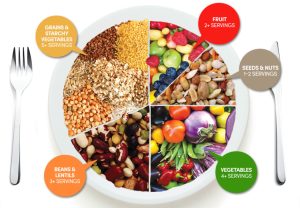
Eating organic foods is becoming increasingly popular as more people seek ways to improve their health, protect the environment, and support ethical farming practices. Organic foods are grown without the use of synthetic pesticides, fertilizers, or genetically modified organisms (GMOs), making them a cleaner and more natural alternative to conventionally grown foods. In this comprehensive guide, we’ll explore the top 10 benefits of eating organic foods, helping health-conscious consumers make informed decisions about their diets.
1. Reduced Exposure to Harmful Pesticides
One of the primary benefits of eating organic foods is that they are free from synthetic pesticides and herbicides. Conventional farming often uses chemical pesticides to prevent pests and increase yields, which can leave harmful residues on fruits, vegetables, and grains. Long-term exposure to these chemicals has been linked to various health problems, such as hormone disruption, fertility issues, and even cancer. Organic farming practices prohibit the use of synthetic pesticides, ensuring that the food you consume has lower levels of these harmful substances.
2. No Genetically Modified Organisms (GMOs)
Genetically modified organisms (GMOs) are plants or animals whose DNA has been altered in a way that does not occur naturally. While GMOs are widely used in conventional farming to increase crop resistance to pests and boost yields, there is ongoing debate about their long-term health effects. Organic foods, by definition, are non-GMO. Choosing organic means you are avoiding potential risks associated with genetically modified ingredients, such as unintended allergenicity, toxicity, and other adverse effects on health.
3. Higher Nutritional Content
Numerous studies have shown that organic foods often have higher levels of nutrients compared to conventionally grown foods. Organic fruits, vegetables, and grains typically contain more antioxidants, vitamins, and minerals, which are essential for maintaining good health. For instance, organic produce has been found to contain higher levels of vitamin C, iron, magnesium, and polyphenols, compounds known for their ability to fight oxidative stress and reduce inflammation. Additionally, organic meats and dairy often contain higher levels of omega-3 fatty acids, which are beneficial for heart health.
4. Better Taste and Freshness
Many people who switch to organic foods report that they notice an improvement in taste. Organic fruits and vegetables tend to have richer flavors because they are grown in healthier soil without synthetic fertilizers, which can contribute to bland produce. Organic food is often grown locally and harvested at peak ripeness, which helps preserve its flavor and freshness. Additionally, because organic food does not contain artificial preservatives, it tends to be fresher, making it more enjoyable to eat.
5. Healthier Skin and Hair
Eating organic food can have a positive impact on the health and appearance of your skin and hair. Conventional farming uses a wide range of chemicals, including pesticides and herbicides, which can be absorbed into the food we eat. These chemicals may contribute to skin irritation, acne, and other dermatological issues. Organic foods, which are free from these harmful chemicals, can help improve skin health by reducing exposure to potential allergens and toxins. Many people who switch to an organic diet report clearer skin and healthier hair as a result.
6. Improved Digestive Health
Organic foods can promote better digestive health due to their higher fiber content and lack of artificial additives. Fiber is essential for maintaining a healthy digestive system, and many organic fruits, vegetables, and grains are naturally higher in fiber than their conventionally grown counterparts. Additionally, organic food is less likely to contain artificial preservatives, flavorings, and colors, which can irritate the digestive tract and lead to discomfort, bloating, or other gastrointestinal issues. Organic food can also support the balance of beneficial gut bacteria, promoting a healthier microbiome.
7. Reduced Risk of Antibiotic Resistance
One of the major concerns with conventional meat and dairy products is the widespread use of antibiotics in animal farming. Antibiotics are often administered to livestock to promote growth and prevent disease in crowded living conditions. Overuse of antibiotics in animals has contributed to the rise of antibiotic-resistant bacteria, which can pose serious health risks. Organic farming practices prohibit the use of antibiotics and growth hormones, reducing the likelihood of consuming antibiotic-resistant bacteria. By choosing organic meat and dairy, you can help minimize the spread of antibiotic resistance.
8. Support for Sustainable Agriculture
Organic farming is known for its commitment to sustainability and environmental health. Organic farming practices prioritize soil health, water conservation, and biodiversity. Organic farms use crop rotation, cover cropping, and composting to maintain soil fertility and reduce erosion, which helps protect the land for future generations. By supporting organic agriculture, you are contributing to a more sustainable food system that minimizes the environmental impact of food production. Organic farming also reduces the pollution of water sources from synthetic chemicals, creating a cleaner environment for everyone.
9. Animal Welfare
Organic farming practices generally offer better conditions for livestock compared to conventional farming. Organic regulations require that animals have access to the outdoors, are provided with more space to move around, and are fed an organic diet free from antibiotics and growth hormones. By choosing organic meat and dairy, you are supporting more humane treatment of animals, which aligns with ethical farming principles. Many consumers feel that supporting animal welfare is an important aspect of choosing organic food.
10. Reduced Environmental Impact
Organic farming has a significantly lower environmental impact compared to conventional farming. The use of synthetic chemicals, such as pesticides and herbicides, in conventional farming can pollute the environment, harm wildlife, and contaminate water supplies. Organic farming, on the other hand, avoids these harmful chemicals and promotes practices that preserve and protect the environment. Organic farms also tend to have better soil health and higher levels of biodiversity, which support ecosystems and help mitigate the effects of climate change.
Conclusion: A Healthier Choice for You and the Planet
Eating organic foods offers numerous benefits, from better health and improved nutrition to supporting environmental sustainability and ethical farming practices. By choosing organic, you are reducing your exposure to harmful chemicals, protecting the environment, and supporting healthier food production practices. Whether you’re concerned about pesticides, GMOs, or animal welfare, eating organic is a powerful way to improve your diet and contribute to a more sustainable and healthier world. Making the switch to organic foods can be a rewarding choice that benefits not only your health but also the planet.



 DailyMediCure
DailyMediCure 









